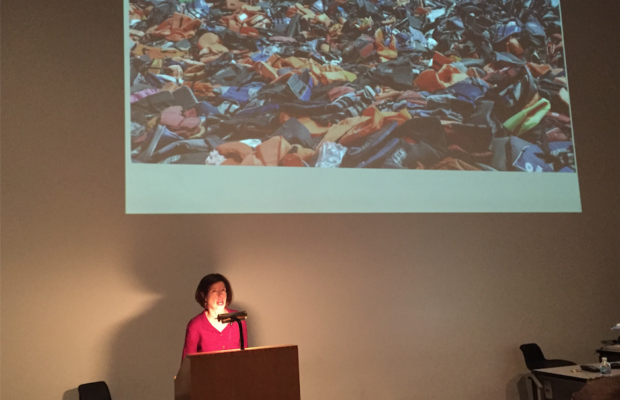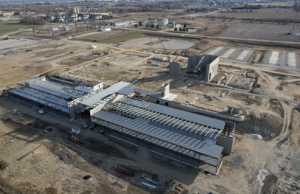Author shares tale of refugees

On the small island of Lesbos, Greece, tens of thousands of deflated life jackets and debris are strewn across the ground. The jackets were left by Syrian migrants who crossed the Mediterranean Sea. About 3,400 refugees and migrants landed on Lesbos each day last year in order to find safety, according to the United Nations refugee agency.
The lifejackets are a testament for the thousands of immigrants that struggle to find safety, said Susan Faludi, a Pulitzer Prize-winning author.
“We live in the age of the refugee,” Faludi said, and projected an enormous image of the lifejackets on the wall behind her as part of her speech to a packed auditorium at the University of Northern Iowa on Feb. 6. She spoke about her recent book “In the Darkroom,” and connected stories from her book to her family’s identity and the idea of refuge.
In Faludi’s family, identity was always put on the back burner. The Jewish Hungarian family members were in danger when World War II started in the 1940s, and were eventually refugees themselves.
“My grandfather was head of the Jewish community and was forced to see them taken away,” Faludi said.
Hungary, once a refuge for Europe’s Jews, had turned into one of the worst sites of the Holocaust by 1944. Jews were ordered to take off their shoes on the Danube River bank in Budapest and were killed on the site. Faludi’s father survived the Holocaust and saved his parents by impersonating a fascist officer, which would end up being one of his many identities in life.
After WWII, Faludi’s father left Hungary and escaped to Brazil to make films. After moving around to other countries, he moved to America to live the “American dream.” He bought a red Ford convertible and changed his name to Steve, another identity change.
Faludi’s childhood was bittersweet with her father. “He couldn’t shut off his demons, so he recreated himself over and over again,” Faludi said.
In 1990, Faludi’s father moved back to Hungary. “I always wondered how could he go back where he was hunted and where his family was murdered,” Faludi said. Even today, Hungary struggles with refugees and treating them with respect and kindness.
Just as Faludi’s family’s culture and community had been taken away in the Holocaust, modern day Hungary reflects similar aspects. In 2016, 3,000 Syrian refugees sought refuge in the Keleti train station in Budapest, Hungary.
“One baby was born in the underpass. His name was Sudan, which means ‘shelter,’” Faludi said. “Immigrants and refugees were always considered as invaders.”
The refugees were promised a ride to Germany, but the train was in horrible condition, and only brought the immigrants to a stop in the middle of the countryside.
Despite the ongoing conflicts in Hungary, Faludi no longer spoke to her father due to her dark childhood and her parents’ divorce. Years later, she got an email from her father. “I’ve got some interesting news for you,” her father Steve wrote. “I have decided that I have had enough of impersonating a macho aggressive man that I have never been inside.”
Linked to the email was a collection of photographs that showed her father, now named Stefánie.
Faludi’s father had flown to Thailand and gone through a sex change into a female as a 76-year-old. “My father was one who struggled with identity,” Faludi said.
Faludi went to go visit her and see what Stefánie was all about. Upon arrival, the aggressive father she had left behind years ago was now an overly feminine woman who acted like Marilyn Monroe.
Faludi’s father asked for one thing: “Write my story.”
Faludi’s father had always hidden from what she really wanted to be. “Was this my father once again finding refuge, or was this him at peace?” Faludi asked. “I have learned something about this whole process: Identity and refuge is not something to be controlled,” Faludi said.
On one of the last days with her father before Stefánie’s death in 2015, the two of them went to the surviving great synagogue in Budapest, Hungary. Sitting in the pew in this sacred place, Faludi felt at peace with her father.
Her identity and refuge was there and she recovered part of her Jewish identity as well. “She recited the blessing that a parent gives on sabbath to me,” Faludi said.
“May God bless you and watch over you.
“May God shine His face toward you and show you favor.
“May God look on you with favor and grant you shalom peace.
“She was giving me refuge,” Faludi said.
The process of writing “In the Darkroom” all started with her father, but it ended with her understanding of refuge. “This was a book I had to write. Writing is my way of figuring out what I am thinking,” Faludi said.









You must be logged in to post a comment Login